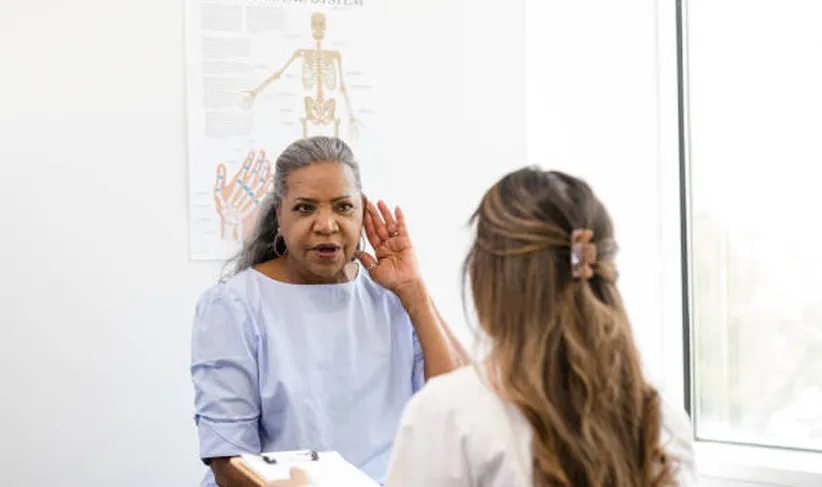Audiology
Specialists
With Clinics Throughout Greater Houston
Untreated hearing loss or audiology issues can diminish your quality of life, but help is within reach.
What is audiology? Audiology is a specialized medical field focused on diagnosing, managing and treating hearing and balance disorders. Our board-certified audiologists at Allergy & ENT Associates offer expert care to restore hearing, improve your ear health and enhance your day-to-day living.
Are you dealing with hearing loss, balance issues, chronic ear infections or tinnitus? Our hearing specialists can help. We focus on long-term results rather than temporary fixes, using innovative diagnostic tools for personalized, effective solutions.
When to See Our Audiologists
Have you been struggling to hear conversations with friends and family?
Are you cranking up the volume on the TV or your phone?
Are you dealing with recurring ear infections?
Hearing loss, tinnitus and ear infections are common but complex issues. If you’re experiencing any of these audiology symptoms, it may be time to seek care from a hearing specialist. Audiologists go beyond basic treatments to identify and resolve the root causes of your symptoms.
At Allergy & ENT Associates, our audiologists provide comprehensive care to alleviate these issues, enhancing your well-being and connection to the world around you.
Symptoms Treated by Audiologists:
- Difficulty following conversations, especially in crowded places.
- Muffled hearing, or feeling like sounds are distant.
- Frequent requests for others to repeat themselves.
- Tinnitus of the ear (ringing, buzzing or hissing in your ears).
- Persistent ear pain, discharge or recurring ear infections.
- Vertigo, dizziness or balance problems.
TREATMENT OPTIONS
Hearing Test
Using advanced diagnostic tools, we pinpoint the exact cause and severity of your hearing loss. Hearing testing assesses your hearing ability and provides personalized insights into the best course of treatment.
Explore Hearing TestHearing Aids
Rediscover the joy of clear hearing with state-of-the-art hearing aids. Our audiologists will help you select customized devices that best match your needs and lifestyle. We offer a range of options, including nearly invisible and rechargeable models.
Explore Hearing AidsCerumen Removal
Excess cerumen (earwax) buildup can lead to discomfort, muffled hearing and even ear infections if left untreated. Our skilled audiologists provide safe, gentle and effective earwax removal at all of our office locations.
Explore Cerumen RemovalHearing and Ear Protection
Protecting your hearing is essential at every stage of life, especially when exposed to loud noises that can cause permanent hearing loss. Whether you’re a musician, an outdoor enthusiast or work in noisy environments, we offer customized solutions to safeguard your ears and preserve your hearing health.
Explore Hearing and Ear ProtectionGetting to the Root Cause of Your Audiology Issues
Hearing problems can arise from a combination of physical and lifestyle factors. Structural issues or repeated exposure to loud noises can significantly impact your hearing. Understanding the type of hearing loss you’re experiencing is essential for effective treatment.
Audiologists vs. a Family Doctor
Family doctors provide basic hearing tests and treat minor ear infections. However, they aren’t equipped to address the root cause of your symptoms. Audiologists provide comprehensive care to support complex hearing issues.
At Allergy & ENT Associates, our board-certified audiologists use advanced diagnostic tools to pinpoint the exact cause of hearing loss, tinnitus or balance disorders. From hearing aids to specialized surgical care, we offer tailored solutions to help you hear better and enhance your quality of life.
Take the first step toward better hearing with expert care you can trust.

Hearing Loss Types
Typically resulting from infections, excessive earwax buildup or a perforated eardrum, these issues affect the outer or middle ear and can lead to discomfort, hearing loss and an increased risk of further complications if left untreated.
Inner ear or auditory nerve damage within the ear is often caused by exposure to loud noises, overexposure to noisy equipment or sometimes due to aging.
The result of a combination of conductive and sensorineural hearing loss factors.

Pediatric Audiologists
Children deserve to thrive in communication, education and everyday life. Hearing loss in children can impact speech development, social interactions and learning abilities. At Allergy & ENT Associates, our audiology specialists provide expert care to identify hearing issues early. With a focus on comfort and safety, we offer tailored treatments to ensure children receive the support they need.
Are you a candidate for hearing loss treatment?
Take our hearing quiz!

Time's up
GET READY FOR CLARITY
From Your Audiology Symptoms
“Did a great job doing a difficult audiology assessment on my 2 yr old. One of the only places outside of downtown Houston that could/would accommodate us. Staff was friendly. Wait time was reasonable (less than 15 minutes).”
Audiology support can improve speech understanding, communication and quality of life. Studies show that 90% of users with mild to moderate hearing loss experience significant improvements.
